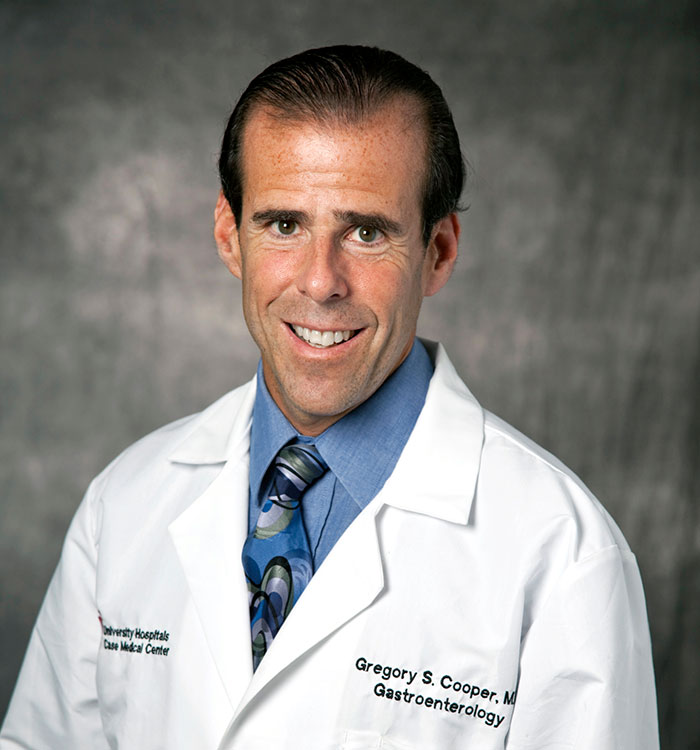Stool DNA Testing
May 30, 2018
Studying the potential of an innovative colorectal cancer screening method
 Gregory Cooper, MD
Gregory Cooper, MDColorectal Cancer (CRC) is the fourth most common cancer in both American men and women. Although CRC rates have steadily fallen over the past 10 years, it remains second only to lung/bronchial cancer in estimated deaths in 2018.1
Gregory Cooper, MD, Medical Director, GI Cancer Center of Excellence and Co-Program Leader, Cancer Prevention, Control & Population Research, University Hospitals Cleveland Medical Center; Professor of Medicine, Oncology and Quantitative and Population Health Sciences, Case Western Reserve University School of Medicine, wants to improve the delivery of CRC screening. The program’s goals are to ensure that more people get screened, and that they are screened at the right time and with appropriate follow-up.
AN ALTERNATIVE TO COLONOSCOPY
Colonoscopy is the “gold standard” for CRC and polyp screening, but it's unpopular with patients. It requires bowel prep, a day off work and typically sedation, which means patients must find transportation to and from the appointment.
For patients that fight colonoscopy “tooth and nail,” Dr. Cooper offers an alternative option.
“It's better to get some test than nothing,” he says. For average-risk patients who decline colonoscopy, Dr. Cooper often recommends the stool DNA test. Patients collect a sample at home and mail it to a lab — no bowel prep or anesthesia required.
A team led by Sanford Markowitz, MD, PhD, a School of Medicine professor and attending physician at University Hospitals Cleveland Medical Center, was instrumental in developing the test, which looks for abnormal DNA in a patient's stool to indicate colon cancer.
Over the past several years, Dr. Cooper has studied how the accuracy of the stool DNA test compares with both colonoscopy and the fecal immunochemical test (FIT). FIT detects blood in the stool that could point to cancer or large polyps. “We found [the DNA test] performs quite favorably,” he says. “It has a higher detection rate than FIT and a somewhat higher acceptability on the patient’s part.”
FDA based its 2014 approval of the Cologuard stool DNA test on a prospective trial that involved nearly 10,000 average-risk patients throughout the United States and Canada. The study found Cologuard's sensitivity for CRC was 92.3 percent overall compared to 73.8 percent for FIT.2
SCREENING CONSIDERATIONS
One caveat with FIT and stool DNA tests: if a patient tests positive, doctors recommend a colonoscopy follow-up as soon as feasible to detect and remove polyps or diagnose colon cancer. However, not all patients follow through. Dr. Cooper and team are currently researching ways to improve the follow-up rate.
“One of the reasons patients get stool tests is because they don't want to get a colonoscopy,” he says. “But they must understand that if they have a positive test, they need to get a colonoscopy, as it could indicate serious findings.”
Dr. Cooper and other doctors from UH Cleveland Medical Center and Case CCC have also researched the relationship between CRC screening and the Affordable Care Act (ACA) extensively. The ACA eliminated most out-of-pocket expenses for preventative services such as mammography and colonoscopy.
The assumption that CRC screening rates would rise because more patients could afford testing has not proved true. A 2015 study of Medicare beneficiaries published in the Journal of the National Cancer Institute found a slight increase in mammography uptake after the ACA, but no significant change in colonoscopy screenings.3 “We found reimbursement alone wasn't enough to persuade people to get colonoscopies more often,” Dr. Cooper says.
It's possible that an increase in annual checkups would prompt an increase in CRC screening. But because most tests require a referral, self-insured patients risk missing out on life-saving screening.
“If patients need a colonoscopy for preventative reasons and they don't have a primary care physician or a referral, they can still get scheduled at UH,” Dr. Cooper says. “We try to make it as seamless as possible.”
UPDATED SCREENING GUIDELINES
On May 30, 2018 the American Cancer Society recommended that average-risk individuals be screened for CRC beginning at age 45. In June 2017, the U.S. Multi-Society Task Force on Colorectal Cancer updated its screening guidelines with the following important modifications:
- African Americans should get screened beginning at age 45 due to this population's increased cancer risk.
- People with a first-degree relative diagnosed with colorectal cancer or an advanced adenoma (large polyp) before age 60 should get screened beginning at age 40 or 10 years before the age that their relative was diagnosed, whichever comes first.
Alarmingly, the organization also found an increased rate of CRC in people under age 50. Although the number of younger individuals with CRC remains low, physicians should take note.
“Before, if you had a young patient come in with rectal bleeding you may assume hemorrhoids,” Dr. Cooper says. “The cancers young people are getting are disproportionately in the rectum and lower part of the colon, which are more likely to cause bleeding. We recommend those patients get an evaluation.”
To schedule an office visit with Dr. Cooper, please call (216) 844-8500.


